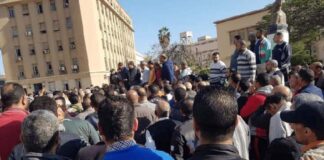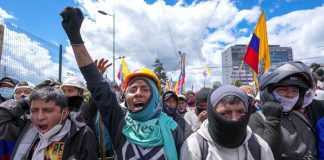The final round of the Egyptian presidential election presents the real danger of counter-revolution in Egypt.
After the first round of voting, a run off for President will now take place between the two top candidates in the first round of voting, the Muslim Brotherhood’s Muhamed Mursi, and Ahmed Shafiq, a leading representative of the old Mubarak regime, on June 17.
While it’s positive that Hamdeen Sabbahi, a left nationalist backed by many workers, came a close third in the first round, the success of such an open counter-revolutionary as Shafiq shows the military regime is regrouping in an attempt to undo the revolution’s gains.
Protest
Shafiq openly plans for a counter-revolution. A former Air Force General and Mubarak’s last prime minister, he has called Mubarak a “role model”. He has declared that he will have the streets under control again “within 24 hours” of assuming leadership. He is backed by big business and the military, and supports the military’s on-going “guardianship” role, suggesting that Egypt’s much hated “emergency law”, allowing extrajudicial detention, will have a central role to play in a future Egypt under his control.
Shafiq’s support reflects both the weight of Egypt’s ruling class and the military backing for his ticket.
Many Egyptians recognise what’s at stake in the Presidential race. Activists have declared a Week of Rage in the lead-up to the election run-off, with marches from the homes of martyrs of the revolution—those murdered by police, troops and thugs. A popular chant is “we are never going back!” (to the old regime).
Millions of protesters returned to the streets of Egypt shortly after the first round of voting, in anger at the court verdict in the trial of former dictator Hosni Mubarak. He received life in prison for the murder of people during last year’s revolution. But senior police officers who organised the killings were acquitted, and Mubarak’s family members found not guilty of corruption.
Class and religion
Shafiq has tried to spread fear about the Muslim Brotherhood and other Islamic groups, claiming they want the repression of women and the Coptic Christian minority. This view is often echoed in the West, with claims the division between Islamists and secular institutions is the central division in Egyptian society.
But the central division in Egyptian society is not religion, but class—between those who have fought and died for the revolution, and those who wish to re-instate the dictatorship that profited off the repression of the Egyptian people.
That’s why the Egyptian Revolutionary Socialists are calling for a vote for the Muslim Brotherhood’s Muhamed Musri. Significantly, the April 6 Youth Movement is now doing the same.

There is no doubt that the Muslim Brotherhood’s leadership has had a relatively unimpressive history in the revolution so far. They have been eager to make deals with the military regime to secure a position in government, and their program is for a neo-liberal Egypt. They have, however, a mass base in the working class that they must answer to, and they have been forced to incorporate some key demands of the revolution into their program to maintain their support.
Many of the Brotherhood’s grassroots activists were on the front lines of the revolution despite their leadership’s cowardice and conservatism. Their efforts to work with the military regime have already seen a number of splits.
The Egyptian Revolutionary Socialists’ call to vote for the Brotherhood is not uncritical by any means. They are demanding that the Brotherhood commit to some of the most important demands of the revolution: legal protections for unions, equal rights for women and Christians, and the formation of a presidential coalition which includes knocked out presidential candidates Hambdeen Sabbahi and Abd-al-Moneim Abu-al-Fotouh, both seen as closer to the revolution, as Vice-Presidents.
In power the Brotherhood would inevitably seek to cut deals with Egypt’s military rulers and enforce neo-liberal policies that attack workers’ living standards. But unlike Shafiq the revolutionaries could pressure them by mobilising the Brotherhood’s base against the leadership in struggle against the new president.
Shafiq’s victory would mean an open and brutal crackdown on the revolutionaries and a violent dismantling of the new independent unions built in the last year.
This election matters for the future of the revolution.
That future also depends on extending working class organisation and struggle from below, not only against the remains of the Mubarak regime and the military, but also against those who want to work with them in the Brotherhood. Pulling the mass base of the Brotherhood deeper into the revolution will be crucial to this.
Emma Torzillo





